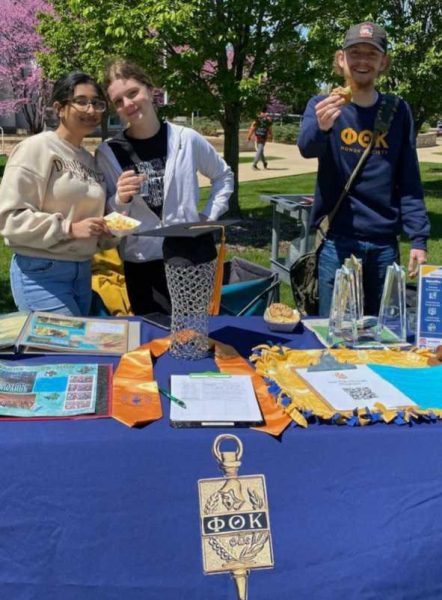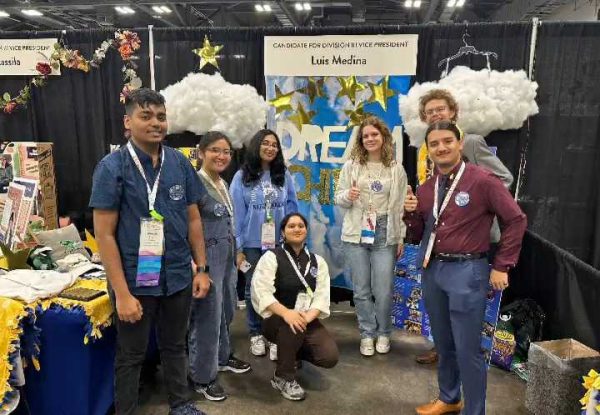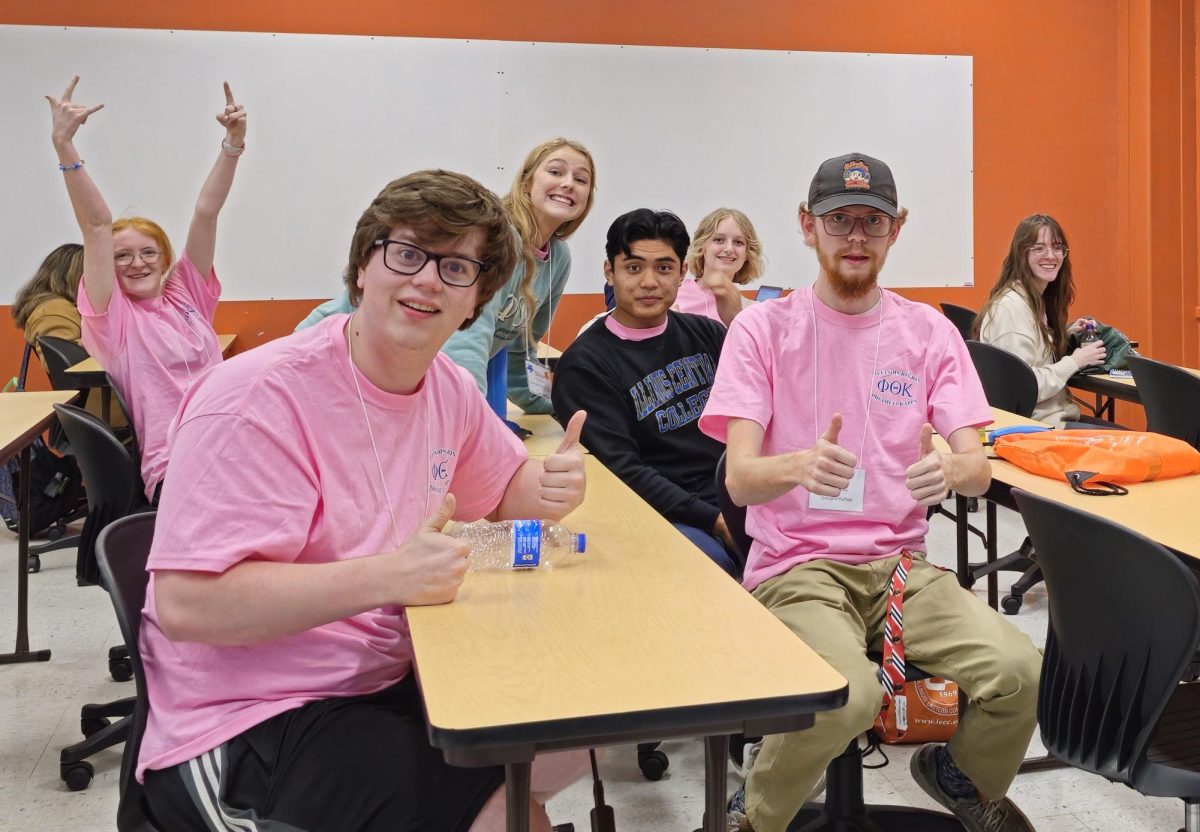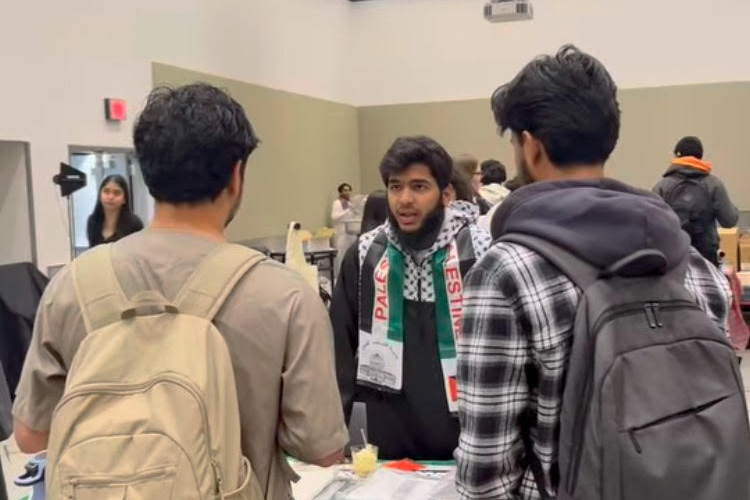Traveling across the country for conferences, designing campaign strategies, creating research projects, and receiving thousands of dollars in scholarships are just some of the defining experiences enjoyed by members of Phi Theta Kappa National Honors Society.
In COD’s PTK chapter, math and economics student Ty Giordano serves in the president role. For Giordano, the College Projects scholarly research and the teambuilding are two of the most valuable experiences of membership.
“Being involved in leadership activities has led to a lot of personal growth for myself,” Giordano said. “It has also exposed me to the research we’ve done through the College Project. You get a nice sample of different things you could be interested in. It’s led to a lot of others on my team, I’ve seen them grow. The main thing is for Phi Theta Kappa, especially for our chapter, we’re service-first and engaging with the college trying to prioritize our Phi Theta chapter.”
The team’s plans were further described by Ethan Nievara, the vice president of chapter operations.
“For this year, the team is entirely new. The first semester was spent figuring out our roles and responsibilities, getting used to being part of the leadership team,” Nievera described. “We’re gonna start prioritizing service in the community now that we’ve settled into our roles. I’m gonna be looking into avenues we could be exploring for service, like helping out at food pantries.”
Service is one of four pillars of PTK, the others being scholarship, leadership and fellowship. In the last two years, COD’s PTK chapter led a pet shelter donation drive and participated in the Walk-for-Wishes charity event in Chicago. Christine Kickels, who is an adviser of PTK, explained how these service learning events are also implemented as COD programs.
“It’s worth noting that one of the efforts years ago by PTK was the establishment of the Fuel Pantry. That came out of what we call our College Project,” Kickels said. “It was actually run by PTK members in its infancy. Service is one of our pillars; teams over the years have been connected to some kind of volunteerism.”

Another important activity for PTK is the Honors in Action and College Projects. These encourage academic research and problem-solving for real community issues, often with college administration help. A few PTK officers are selected to lead the projects, while the others provide support and feedback.
“For the College Project in our chapter, all the different officers have things they’re responsible for,” Nievera said. “Our College Project last year was about mental health. I think what they did was reach out to other community colleges [about mental health programs.]”
Nick Karmia who is a COD alum and former officer of PTK also described the mental health projects PTK members developed to address the need of counselors at COD. They hosted an art event, where students filled out mental health surveys before and after painting to gauge the effect on their mental state. PTK members also proposed a student ambassador team to provide mental health support to their peers.
“Student ambassadors would be trained by mental health professionals within NAMI DuPage and counseling staff at COD,” Karmia said. “It would increase the network of mental health support, being other trained professionals to sit down and talk to students.”
After working on these types of research projects and volunteer events, PTK students have the opportunity to share their work with other PTK chapters. There is the regional conference and the international conference, which occurs annually in different cities and draws in students from PTK chapters around the world. Kickels stated this semester’s conference will take place in Orlando, Fla. over four days in April.
“That will attract probably 4,000 community college students from around the world,” Kickels said. “It will be conference-style presentations, lots of networking and fun activities at night, totally geared at students. They call it the Catalyst event. We’re really fortunate that we can take a small group every year to the conferences.”
Giordano said these conferences are beneficial for academic growth.
“Last time we went to a regional conference in Robinson, Ill., we did some modules on how to transfer schools,” Giordano recalled. “I can attest that it can be pretty helpful for students, since a lot of these students are gonna be doing either two years in community college or four years after transferring. Within that one regional conference, there were a lot of chapters from Illinois all across the state. It was great to talk to leaders from different campuses to ask what’s going on, what College Projects are they doing. It’s fun to talk to other community college students.”
These conferences can also serve a monumental role in connecting student bodies across the country, as Karmia pointed out.
“It’s mind-blowing to meet people from across the world,” he said. “I’ve met people from St. Thomas, like the Virgin Islands, there’s a chapter out there. I probably met one person from each state when I went to Catalyst.”
Karmia’s favorite experience during PTK was serving as campaign manager for COD student Luis Medina, who was elected as international vice president of PTK’s Division 3 Midwest region.

“To be the ambassador of all PTK chapters of that region, it’s a huge position that comes with a lot of responsibility because you’re representing so many different people in so many different community colleges,” Karmia said.
The campaign opportunity also helped Karmia speak to a diverse variety of students about how PTK fuels their academic ambitions. For smaller colleges, PTK can be a central support system.
“You’re meeting people from like Heartland College, students who are from southern Illinois who have nowhere near as large of an institution as College of DuPage,” Karmia explained. “Some of these community colleges don’t really have that community aspect because they’re not as large, and they don’t have as many clubs and orgs, or just they don’t have a very huge budget as an academic institution. PTK isn’t just a resource to people, it’s a way of life to these people because it’s the society that’s on campus for them to connect to.”
Beyond the academic and social impact, many students join PTK for the scholarship opportunities that are specific to only PTK members. Various universities offer different amounts of scholarships to transfer students from community colleges.
“There’s the scholarship aspect where they’re setting you up for success with a couple thousand dollars. I like to see that as a new laptop,” Giordano pointed out. “The scholarship we get is essentially the reward, especially the schools that a lot of students from COD transfer to. They offer really good bonuses and scholarships just for being either a member or, I believe, even a higher scholarship for being an officer with PTK. It’s good that just by having that couple thousand dollars, it means a couple less hours working, which is more time studying, more time relaxing, taking care of yourself.”
For students who hesitate to join PTK due to the application fee or worries about commitment, Nievera encourages them to take the leap.
“You can get the $80 membership fee waived if you’re a Presidential Scholar,” Nievera said. “The return you get from committing to PTK and the amount of leadership skills and other service you engage with and what you learn from that, I would attest it really enriches your two years or however long your college experience at COD is.”
Kickels also encouraged students to join, whether they’re only seeking scholarships or want to participate in the opportunities.
“I usually tell students when they’re on the fence, you are gonna get out of it what you put into it,” Kickels said. “If you want to be a member that is solely a member in name, so you can be qualified for scholarships, that’s fine. But we have a select group, and here’s two of the best [Ty and Ethan], that have jumped right in, and they are exhausting every opportunity for planning, leadership, communication, public speaking.”
Karmia echoed her sentiment in his experience as an alum.
“College is an experience that only matters to you as much as what you make of it. You have to participate in clubs and orgs if you really want to make the best of your college. You gotta have networking and career opportunities to the max,” Karmia explained. “PTK is an exemplary example of that. The opportunities are endless. You never know who you’re going to meet. You never know if you’re going to become a campaign manager for the international representative.”
He encouraged students to take extra initiative for their goals when applying to competitive universities and career fields. For Karmia, his PTK experience helped fuel his goals as a journalism student at Arizona State University.
“Journalism and storytelling is my passion. I want to go where that passion of mine will be fully taken care of,” Karmia said. “[Now] I’m going to the Cronkite School. I’m going to a different part of the United States to fully immerse myself with a different culture, to advance my storytelling skills to the next level. I want to have the same commitment as all these people that I met at these PTK events.”
As a current PTK officer, Nievera described how PTK is instrumental in his university applications as he searches for an economics program to transfer to.
“The schools that I’m applying to, some of them give lots of benefits for being a PTK member,” Nievera said. “There’s this one school, Forest College, if you’re a transfer student and a PTK member and above a certain GPA, they basically pay for your college. That’s just one example. I’m not saying all schools will offer the same amount of scholarships. It’s honestly gonna depend on your situation, what type of school you’re going to, what you’re majoring in, and your career goals.”
To learn more about PTK, visit the ChapLife webpage or attend their weekly meetings on Thursdays from 3 to 4 p.m. in SSC 1202. To access the PTK scholarship, check out COD’s Transfer Scholarship Opportunities webpage.









